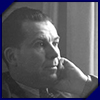Skip to content
- 1905-1916
André Jolivet born in Paris on August 8th 1905 at rue Versigny in Montmartre, the son of Madeleine Perault (1874-1936) and Victor-Ernest Jolivet (1869-1954). His father, a minor fonctionary for RATP, was a keen amateur painter.
He attends the following schools : Institution de Mademoiselle Bulle, École maternelle, rue du Mont-Cenis ; then primary school, rue Sainte-Isaure, where one of the teachers was Mr. Farigoule, the father of Jules Romains.
From the age of four, he starts learning piano with his mother who played and taught piano. Later he works on tonic sol-fa and piano with Mrs Francis Casadesus.
At the start of the WW One he is part of a group of children who posed for the painter Poulbot. This experience inspires the young Jolivet to sketch popular scenes like those of Poulbot.
At the same time, he becomes acquainted with Abbé Théodas, choir-master of Notre-Dame de Clignancourt, with whom he would study harmony. With him, he discovers liturgical songs, the music of Schütz, Palestrina, Monteverdi, Bach, Mozart.
- 1917
For the first time he goes to the Comédie-Française which he will continue tovisit enthusiastically. From that moment his one ambition is to become a member of the Comédie-Française company.
- 1918
With this goal in mind, he builds a paper theatre complete with sets and characters for which he writes dialogue and poems. Some of these poems he puts to music, and writes his first musical piece : Romance barbare.
In the same year he becomes a student at the École supérieure Colbert where his uncle Charles Pérault teaches.
- 1919
In a diary entry on his birthday, August 8th he notes that he has discovered Teilhard de Chardin’s text, La puissance spirituelle de la matière. Years later, he will return to Teilhard de Chardin in the cantata Le cœur de la matière.
He begins studying painting with the cubist painter Georges Valmier (1885-1937).
Valmier, a member of the “Chœurs de Saint-Gervais”, of which Paul Le Flem was the musical director, will become an important influence on Jolivet’s career. Later, he introduces him to Paul Le Flem.
- 1920
Having abandoned piano, he buys a cello with his savings and studies this instrument with Louis Feuillard, a celebrated cello teacher.
He continues to direct and perform in several plays.
- 1921 to 1924
In 1921, he is accepted as a pupil at the École normale d’instituteurs d’Auteuil from where he graduates in 1924.
Meanwhile he continues his musical studies.
- 1924 to 1927
He is called for three years military service in the cavalry, at Colmar and Mulhouse.
- 1927
He begins teaching in primary schools of the City of Paris. All his life, he remains interested in pedagogic issues.
